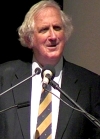Geoffrey Blainey

Geoffrey Blainey, a practising historian for some sixty years, has written on Australian and world history. Long attracted to museums, he was deputy chairman of the Whitlam government's Enquiry into Museums and National Collections in 1974–75. Later, he served on the board of the Australian War Memorial for seven years. His book, The Causes of War (1973, 1988), is debated in military academies and in US universities.
Occasionally, a television series on history is accompanied by an excellent book. Jacob Bronowski, anchorman for TheAscent of Man (1973), produced a book of the same name, the more remarkable because it lucidly explained complicated topics in the history of science. John Kenneth Galbraith’s challenging and quietly amusing The Age of Uncertainty (1977) came from another BBC series. Now the histor ... (read more)
This is a book about warfare, battles and the preparations for them. It is not comprehensive but it is systematic, for it selects major periods or episodes in Western military history in the last one thousand years and, by applying economic theory, tries to pluck lessons from them. It extends from the mania for building fortified castles in medieval times to the bombing of Nazi Germany and the eco ... (read more)
It was a bright and bold idea of Graham Freudenberg to write a book on Winston Churchill and his long links with Australian political and military life. Though Churchill didn’t visit Australia – ‘wise man’, some said – he was a strong or even decisive influence at several turning points in our history and indeed our mythology.
Churchill exerted influence here long before 1940, when he b ... (read more)
It is such an obvious subject for a book. The two most powerful peoples in the world in the past thousand years have been the Chinese-speaking and the English-speaking peoples, and in the past hundred years those speaking English have been the more influential. While Winston Churchill wrote four volumes, which were bestsellers in their time, on the history of the English-speaking peoples up to the ... (read more)
This is the latest volume of a reference work which should sit on the shelves of every municipal library. It assesses the lives of people, mostly prominent, who died in the years 1981–90. It lists them in alphabetical order; a further volume will be needed to embrace the 600 or 700 people whose surnames began with the letters L to Z.
... (read more)
Our fascination with Gallipoli is probably at a peak. Like other symbolic events, it rises, falls and rises again in public esteem and curiosity. In the last quarter of a century, beginning when Anzac Day was at a low ebb, books and documentaries about Gallipoli have flooded bookshops and television stations. This new book by Professor Robin Prior, a specialist Australian historian of World War I, ... (read more)
Australian war historians usually find their theme in the army. Mike Carlton, a well-known journalist, thinks it is time to praise the Australian warship Perth and its men: ‘They were the flower of Australia’s greatest generation. No other has been so tested.’
It is fair to suggest that the Perth is virtually unknown to the typical Australian today, and certainly less familiar than her sist ... (read more)
Paul Tilley classes the Treasury, now housed in Canberra, as ‘one of Australia’s great enduring institutions’. It began humbly in 1901, in a smallish stone building that still stands at the corner of Collins and Spring Streets in Melbourne. That handsome structure appears to be just about the correct size for its initial staff of five. Just across the street stands a statue of Sir William Cl ... (read more)
General ‘Pompey’ Elliott was a famous Australian in 1918, half forgotten seventy years later, and is now a national military hero. This Anzac Day he stood high. On French soil he was praised by France’s prime minister, Édouard Philippe, in one of the most mesmerising and sensitive speeches ever offered by a European leader to Australian ears. Probably Elliott now stands just below General S ... (read more)
